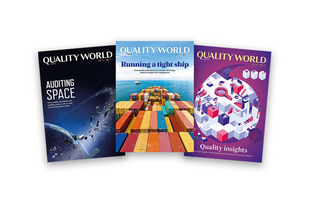
Survival of the pharmaceutical auditor
Progress indicator

Mike Halliday, vice president at NSF Health Sciences Pharma Biotech Consulting, explains the importance of thoroughly auditing your supply chain.
In recent years, as a result of supply chain problems leading to patient harm (for example, the intentionally adulterated Chinese heparin that led to the deaths of 149 Americans) the regulators who set standards for the pharmaceutical industry have issued new legislation and guidance demanding increased and more thorough auditing of the supply chain.
The Falsified Medicines Directive (Directive 2011/62/EU) and the revised guidance in EudraLex (Volume 4 Annex 16) on the certification by a qualified person, demand detailed supply chain mapping and supportive auditing to confirm appropriateness of suppliers of all active ingredients and other critical ingredients – as well as contract manufacturers, packers and testing laboratories.
Historically, health inspectors just checked that audits were being done but now they check examples of audit reports, as well as the auditors’ credentials and training. Never before has so much auditing pressure been placed on so few auditors.
Competence, skills and knowledge
Auditors, their companies and their qualified persons need to demonstrate:
- Competence, skills and knowledge
- A risk-based approach
- Continuing professional development.
This includes ability and training in auditing, knowledge of the processes being audited, and the laws and guidance covering the audited operation. The qualified person will be approving the batch and product, and will take personal responsibility for audits being performed and ensure good manufacturing practices are satisfactory.
The inspector will be checking this, the conclusions reached and actions taken. Increasingly we hear of health authority inspections finding that audits resulting in critical observations being filed are ignored and the product or service continues to be used with no remediation or follow-up. This results in action against licences, companies and the qualified person.
The risk-based approach
New guidance requires an increasing use of formalised risk-based decision making, from deciding what is to be audited and how frequently, to which standards are most applicable. The inspectors use risk-based auditing tools and the pharmaceutical auditor is expected to do the same. Not meeting audit or self-inspection commitments and programmes (regardless of risk), due to other pressing demands on resources is not an acceptable excuse.
The challenges and changes ahead for the pharmaceutical industry are immense – from Brexit to the increase in health authority inspections
Continuing professional development
Process and product knowledge, plus knowledge of quality management systems (the pharmaceutical quality system), and the use of risk-based techniques are tools to create a formidable, professional auditor. These attributes are adequately covered in the International Council for Harmonisation quality guidelines Q8, 9, 10 and 11.
The challenges and changes ahead for the pharmaceutical industry are immense – from Brexit to the increase in health authority inspections, from an ever-growing number of countries and increasingly complex globalised supply networks to ever increasing regulatory expectations.
Survival isn’t compulsory but will require many factors to be aligned. The role of auditors and the need for auditing will increase and more responsibility will be delegated to companies, qualified persons and auditors. With preparation, the best companies and auditors will see all this as a positive opportunity to drive continuous improvement. Those who don’t will not survive.
The Pharmaceutical Quality Group (PQG)
The CQI has a group dedicated to the pharmaceutical industry: the Pharmaceutical Quality Group (PQG). Join the group today – it's been supporting quality professionals in the pharma industry for more than 30 years.
Member only

This article is free to access for a limited time only. Only CQI and IRCA members receive access to all content.
Register to join the Pharmaceutical Quality Group
Develop your knowledge and represent your industry.

